|
|
|
Sort Order |
|
|
|
Items / Page
|
|
|
|
|
|
|
| Srl | Item |
| 1 |
ID:
138260
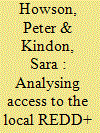

|
|
|
|
|
| Summary/Abstract |
The Reducing Emissions from Deforestation and Forest Degradation (REDD+) project in Sungai Lamandau was Indonesia's first forest carbon finance initiative officially proposed by a community group upon land they intended to control autonomously. However, the flagging carbon market and government licensing obstructions stalled progress towards possible monetary gains. With a focus on the agency of local farmers, we explore the ‘bundles of powers’ that they mobilised to access the other diverse and, at times, elusive set of benefits within the REDD+ project. In the absence of a formal tenure and ‘carbon rights’ regime, local actors' ability to benefit from the project was dependent on social relationships, REDD+ knowledge and access to local markets and capital. The result was a benefit-sharing framework of uneven distribution.
|
|
|
|
|
|
|
|
|
|
|
|
|
|
|
|
| 2 |
ID:
165145
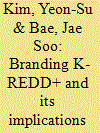

|
|
|
|
|
| Summary/Abstract |
The need for new and stronger middle power diplomacy is growing as global challenges are increasingly governed by various horizontal inter- and trans-national networks. Climate change is one of the most complex and urgent global challenges that require collective action, and it is an issue for which more middle power leadership is greatly needed. The Republic of Korea (ROK) has been successful in becoming a primary actor in green growth governance, and its success has been attributed to its strategic middlepowermanship, integrating both material and ideational contents. Reducing emissions from deforestation and forest degradation (REDD+) in tropical developing countries has been lauded as an immediate and effective solution to mitigate climate change. ROK's unique history of forest transition before rapid economic growth highlights the fact that improving forest management is possible even with imperfect governance, rapid population growth, and low economic development. The lessons learned from ROK's forest transition can be developed as a distinct contribution to the international effort to address forest-related impacts on climate change, and offer an important opportunity for ROK to play a constructive role and achieve enhanced stature within the international community.
|
|
|
|
|
|
|
|
|
|
|
|
|
|
|
|
| 3 |
ID:
138258
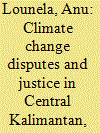

|
|
|
|
|
| Summary/Abstract |
In 2010, the province of Central Kalimantan in Indonesia was established as a Climate Change pilot province to reduce emissions from deforestation and through peat land forest rehabilitation. Today, international agencies, carbon traders, local and national governments, non-governmental organisations, and local populations have participated in debates and disputes over the establishment of carbon forests and forest protection areas in Central Kalimantan. One such scheme, promoted by the government of Australia (Kalimantan Forest and Climate Partnership), intended to establish a REDD+ pilot project within an area that covers about 120 000 hectares in Kuala Kapuas in Central Kalimantan, the field location of this research. This specific dispute offers a case study based on ethnographic research that helps to illustrate how widespread climate change debates and disputes become embedded at local and national levels in Indonesia. The dispute over REDD+ will be discussed within a framework of dispute theories which focus on moments of crisis, wherein participants must present arguments and justify their actions and theories of justice. The article shows that competing and conflicting conceptions of justice that emerge in the dispute may bring to a halt a climate change pilot project in the locality.
|
|
|
|
|
|
|
|
|
|
|
|
|
|
|
|
| 4 |
ID:
152077
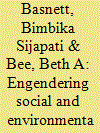

|
|
|
|
|
| Summary/Abstract |
Drawing on feminist and development literature, this paper suggests several important lessons and considerations for building equitable approaches to REDD+. Specifically, we illustrate the conceptual and practical significance of women’s participation for achieving the goals of REDD+as well as the limits and opportunities for gendering participation in REDD+. We argue that the standing debates over how and in what context gender becomes instrumentalised, technicalised or institutionalised in development provide important cautionary tales for the implementation and reporting of REDD+safeguards. By doing so, this paper contributes to the growing literature on gender, development, natural resource management and REDD+.
|
|
|
|
|
|
|
|
|
|
|
|
|
|
|
|
| 5 |
ID:
124177
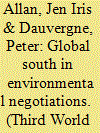

|
|
|
|
|
| Publication |
2013.
|
| Summary/Abstract |
During international environmental negotiations developing countries have commonly employed a unified strategy through the G-77 and China (G-77/China). Compared with other negotiations, such as those on trade and security, this strategy has been relatively successful in securing financial and technical benefits. Unity among developing states is not, however, a characteristic of all environmental negotiations. This paper analyses the case of Reducing Emissions from Deforestation and Degradation plus conservation ( redd +), where unity has been absent. It argues that the negotiation positions, strategies and coalition politics from 2005 to 2013 have been a result of identifiable power asymmetries among developing states (shifting over time). Some states with vast forest resources have held an effective veto, while others have had considerable moral influence and expert authority. Coalitions have courted such relevant and reputational leaders. At the same time some developing states have had enough diplomatic capacity and economic power to stand alone in negotiations. Taking a broad, historical view of the diverse forest interests and power asymmetries among developing states helps to explain the recent stagnation in negotiations to establish an international redd+ mechanism to mitigate climate change.
|
|
|
|
|
|
|
|
|
|
|
|
|
|
|
|
| 6 |
ID:
138261
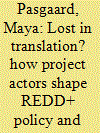

|
|
|
|
|
| Summary/Abstract |
Forest protection policies to Reduce Emissions from Deforestation and forest Degradation (REDD+) are currently being implemented by international donors, governments and conservation agencies across the developing world aiming for reduction of greenhouse gases while ensuring fair distribution of benefits. This paper draws on a case study in northern Cambodia to analyse how conservation practitioners and the local forest management committees engaged in implementing REDD+ actively translate and influence the policy and its implementation in accordance with their respective interests through particular communication strategies. When assessing project progress and outcomes, the conservation practitioners involved in implementing projects show an interest in emphasising positive project assessments by downplaying potential project complications, and by primarily communicating with pro-REDD+ members of the local communities. Powerful actors in the local forest management committees adopt the conservation rhetoric of these practitioners; at the same time, they can interpret and control local access to resources to their own advantage. By doing so, they can ensure continued support, while not necessarily representing all community members or sharing benefits equally. The processes and consequences of this policy translation in a REDD+ arena are discussed and compared with existing dominant trends in environment and development policies.
|
|
|
|
|
|
|
|
|
|
|
|
|
|
|
|
| 7 |
ID:
138254


|
|
|
|
|
| Summary/Abstract |
This paper presents an analysis of changing rationales and tactics among actors engaged in mobilising private finance for Indonesia's emergent Reducing Emissions from Deforestation and Forest Degradation (REDD+) programme. Despite limited flows of private finance so far, private sector actors have been responsible for a great deal of development and innovation in the forest carbon sector in Indonesia, and have thus played – and continue to play – an important part in shaping the country's REDD+ programme. Drawing on extended field research and interviews with key actors engaged with REDD+ in Indonesia, we identify a variety of private investor motivations, strategies and tactics, many of which depart considerably from the common understanding of REDD+ as avoided deforestation funded through carbon offsets. As non-state actors increasingly shape emerging REDD+ projects, they assume important roles as agents of environmental governance – working through a variety of private market and hybrid modes of forest/climate governance. We describe four general modes of engagement, centred around: investment in REDD+ verified emissions reductions; corporate social responsibility; sustainable commodities; and impact investment. The research thus contributes to an improved understanding of the nature of private REDD+ finance in Indonesia, and the implications, potential and limits of private, market-based climate governance.
|
|
|
|
|
|
|
|
|
|
|
|
|
|
|
|
| 8 |
ID:
138262
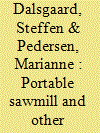

|
|
|
|
|
| Summary/Abstract |
The future for Reducing Emissions from Deforestation and Forest Degradation Plus (REDD+) in Papua New Guinea (PNG) is uncertain. Logging companies have been accessing land via a controversial legal framework called Special Agricultural Business Lease, while conservation non-government organisations are struggling to find schemes to stop the deforestation. REDD+ has been the new favoured approach. However, there are as yet only a few pilot projects, several of which are in areas without large-scale logging. Whether REDD+ has a future in PNG is difficult to know. It may come to share the fate of the portable sawmill – a technology previously assumed to promote sustainable community logging, but is now adopted by the commercial logging industry and providing new challenges to conversation efforts. This article argues that to understand the possibility for successfully implementing REDD+, it is necessary to look at the development of the forestry sector in the widest possible terms. This involves analysing the different competing actors, technologies and forms of social organisation that are employed to gain control of species deemed valuable to either conservation or commercial resource exploitation.
|
|
|
|
|
|
|
|
|
|
|
|
|
|
|
|
| 9 |
ID:
171324
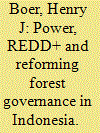

|
|
|
|
|
| Summary/Abstract |
This paper analyses the various power relations that shape forest policy and governance reform in Indonesia. It applies Foucault’s theories on power to several key initiatives introduced as part of REDD+ (Reducing Emissions from Deforestation and Forest Degradation). By analysing both the operation and the effects of power relations the paper accounts for how competing actors influence major policy change, and the impact different policies have on governing multiple forest users. Sovereign and disciplinary power underpins government attempts to implement new regulatory, planning and enforcement functions across the forest estate. Policy instruments such as the concession moratorium create securitised territorial zones that enable sustainable forest practices to operate. By contrast, forest management units operate through inclusive strategies that discipline forest users into responsible managers, whilst enforcement excludes those who contravene the law. Productive power and resistance explain efforts by government and non-government actors to progress or limit REDD+. Productive power operates through the multiple activities that generate new knowledge on incentivising carbon, and by engaging new subjects in carbon projects. Community resistance draws on discourses and localised subjectivities focussed on forest dependency and rights, whereas industry networks have been adept at positioning REDD+ as a threat to national development.
|
|
|
|
|
|
|
|
|
|
|
|
|
|
|
|
| 10 |
ID:
178009
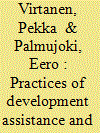

|
|
|
|
|
| Summary/Abstract |
This paper studies how the practices of climate change governance and development assistance have reshaped the Reducing Emissions from Deforestation and Forest Degradation (REDD) process in Mozambique. We look at how the original goals of the Mozambican REDD+ strategy changed in the interplay of different governance-related practices, both those originating locally and nationally, and those coming from international organisations. The paper is based on the frameworks of multilevel governance and practice theory. We identify six combinations of practices that are relevant in the REDD+ programmes and projects. Three of them are incorporated in the general idea of sustainability, including practices of promoting environmental conservation, economic growth and social justice/development, while the remaining three practices are connected to climate-mitigation practices, for which the frame is defined in the United Nations Framework Convention on Climate Change.
|
|
|
|
|
|
|
|
|
|
|
|
|
|
|
|
| 11 |
ID:
137271
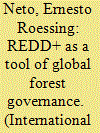

|
|
|
|
|
| Summary/Abstract |
Given the lack of a multilateral convention on forests, global deforestation is being addressed through various initiatives, public and private, local and global. Since 2005, the creation of a mechanism for addressing deforestation (among other things) has been moving forward within the United Nations Framework Convention on Climate Change (UNFCCC) regime. Known as REDD+, it is meant to provide incentives to developing countries in return for forest conservation, with the goal of reducing greenhouse gas emissions. REDD+ could lead to lower levels of deforestation and forest degradation, and to the incorporation of customary governance arrangements in national policy instruments, albeit with some risk of centralisation of forest governance. It could also have a negative social and environmental impact if too much emphasis is put on carbon without adopting the proper social and environmental safeguards.
|
|
|
|
|
|
|
|
|
|
|
|
|
|
|
|
| 12 |
ID:
149601
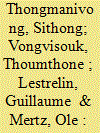

|
|
|
|
|
| Summary/Abstract |
The prospects of receiving funding for REDD+ have set many developing countries on a pathway of policy reforms to integrate REDD+ in national legislation. Progress has been slow partly due to the lengthy international negotiations on REDD+ but also because the policy reforms have not been backed by sufficient commitment to make REDD+ implementation feasible. To contribute to a better understanding of why policy and institutional reforms have not been successful in taking REDD+ implementation further, we analyse the institutional landscape of the forestry and environmental sectors in Laos as a case in point. We interviewed stakeholders from national to village levels and found that REDD+ has been effectively on hold in Laos. This is because of recent institutional transformations, rapid staff turnover and limited implementation capacity of government agencies at the national and sub-national levels all of which have led to a heavy reliance on international support and external consultants. The result is that Laos may not be ready to benefit from the international agreement on REDD+. The situation in Laos provides a compelling example of how difficult REDD+ implementation has proven to be in countries where institution building is still in process.
|
|
|
|
|
|
|
|
|
|
|
|
|
|
|
|
| 13 |
ID:
142659
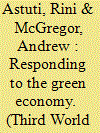

|
|
|
|
|
| Summary/Abstract |
This paper analyses the technologies of government that proponents of the Reducing Emissions from Deforestation and forest Degradation (REDD+) mechanism are adopting to influence forest governance in Indonesia. It analyses the aspects of forest governance being problematised; the solutions being constructed; and who is influencing the production and content of these solutions. The research focuses on three aspects of the One Map Initiative: the forest moratorium; forest licensing; and new standards in participative mapping. Our findings show that the initiative has created new opportunities and constraints for forest reform. New disciplinary and participatory technologies have emerged that have created political spaces for activists to actively promote social and environmental justice concerns. However, our analysis also shows tensions for forest stakeholders between engaging in the new opportunities of the green economy and the risk of having political issues rendered technical.
|
|
|
|
|
|
|
|
|
|
|
|
|
|
|
|
| 14 |
ID:
138257
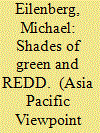

|
|
|
|
|
| Summary/Abstract |
In a time of increasing land enclosures sparked by large-scale environmental initiatives and agricultural expansion, this paper examines local and global contestations over the value of forest on an Indonesian forest frontier. Engaging with recent debates on carbon forestry, the paper problematises the emerging initiatives of ‘Reducing Emissions from Deforestation and Forest Degradation’ known as REDD+ in the province of West Kalimantan, Indonesia. The paper argues that the general rush to implement REDD+ without intimate knowledge of the political landscape of resource struggle is in danger of generating new enclosures of land that may be easily appropriated by local elites, thus excluding less fortunate sections of local society. The paper shows how divergent interpretations of REDD+ are triggering land disputes, and how powerful actors readily appropriate REDD+ discourses as a tool to support divergent claims of land ownership. Government and villagers, through overlapping and contradictory engagements, negotiate REDD+ initiatives with global environmental actors and private plantation companies. The paper highlights the implications of these local realities for the successes of REDD+. The Kalimantan case highlights some of the dilemmas of carbon mitigation initiatives experienced in frontier regions throughout Southeast Asia, places that have become prime battlefronts of large-scale climate change initiatives and agrarian expansion.
|
|
|
|
|
|
|
|
|
|
|
|
|
|
|
|
| 15 |
ID:
138259
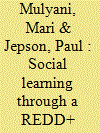

|
|
|
|
|
| Summary/Abstract |
This paper examines the process for establishing a ‘village agreement’ using the Kalimantan Forests and Climate Partnership (KFCP) as a case study. REDD+ is designed as a ‘performance-based’ mechanism and requires a contractual agreement between the parties involved. Since its implementation will affect the life of forest-dependent communities, it is vital that villagers have sufficient ability to negotiate their interests during the agreement process. This paper investigates the degree of ‘social learning’ essential for developing actors' capacity to negotiate rules and interests with outsiders involved in the agreement process (between KFCP and the seven villages involved) and how this meshes with notions of ‘participation’. It found that while ‘social learning’ occurred as a result of the well-designed participatory process conducted by KFCP, villagers' ability to secure their interests was influenced by a learning experience accumulated from their previous engagement with several development/conservation projects. This finding contributes to literature by emphasising how historical context plays a significant role in the success of present learning and the efficacy or otherwise of a contractual agreement. Therefore historical aspects should be taken into account in site selection and the design of future REDD+ projects.
|
|
|
|
|
|
|
|
|
|
|
|
|
|
|
|
|
|
|
|
|